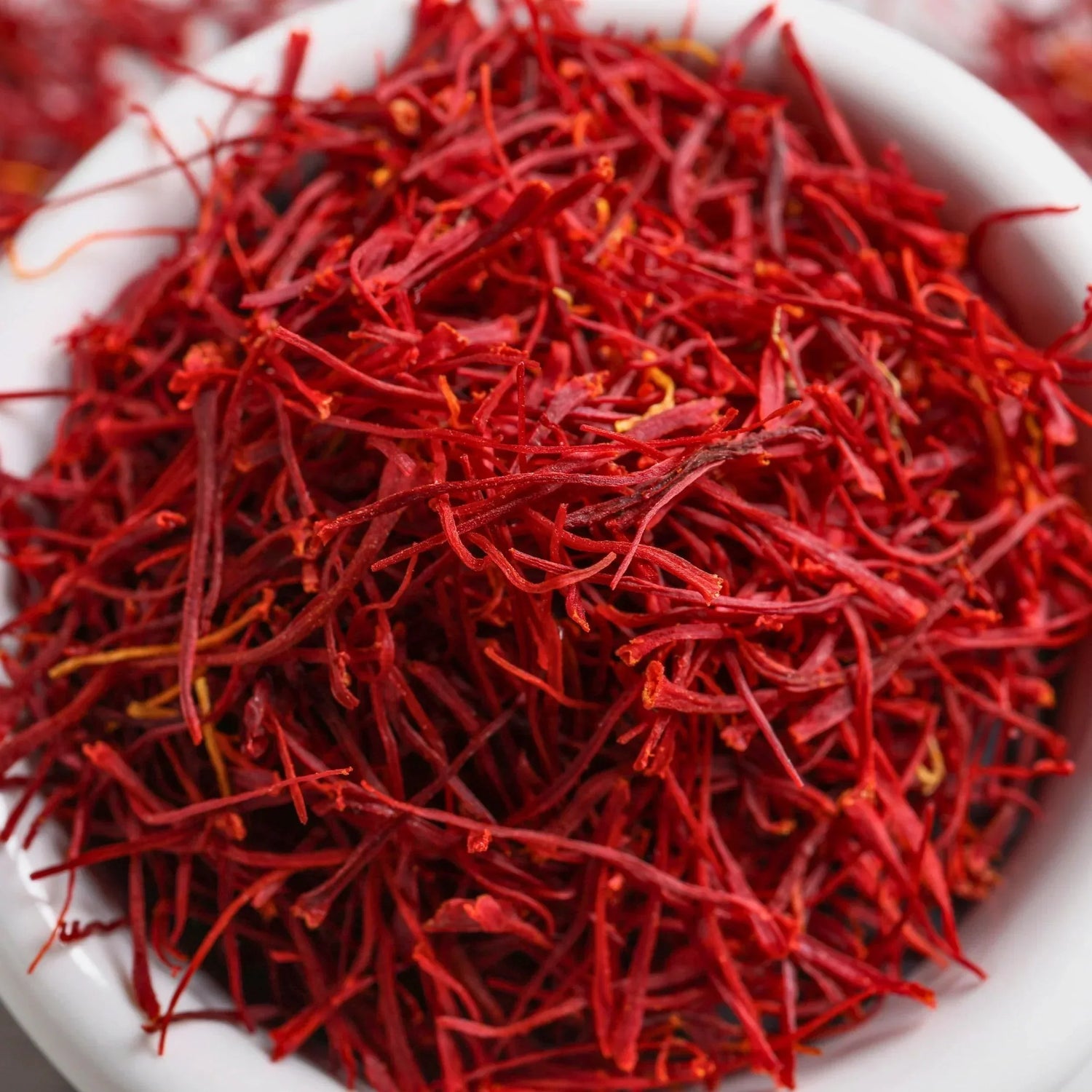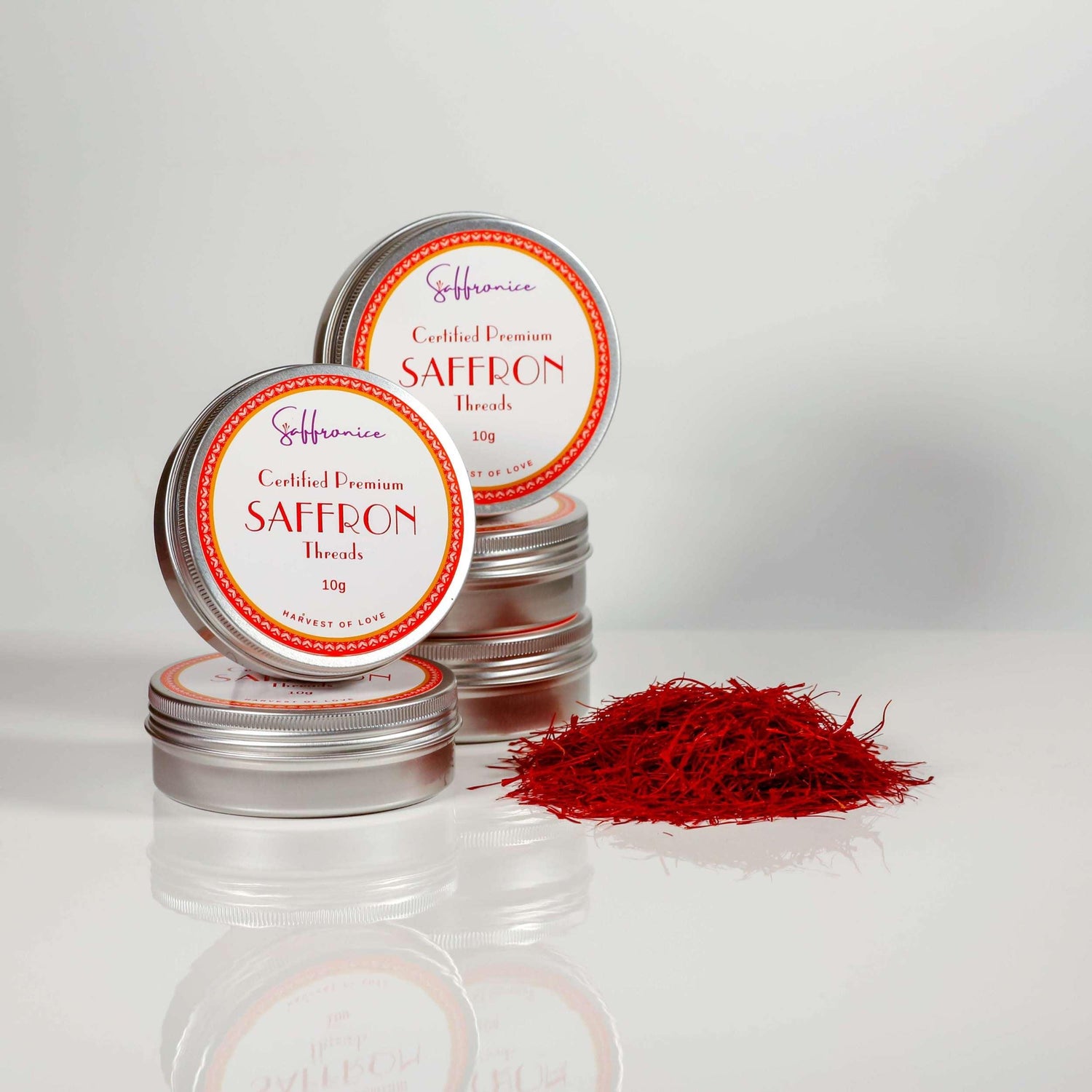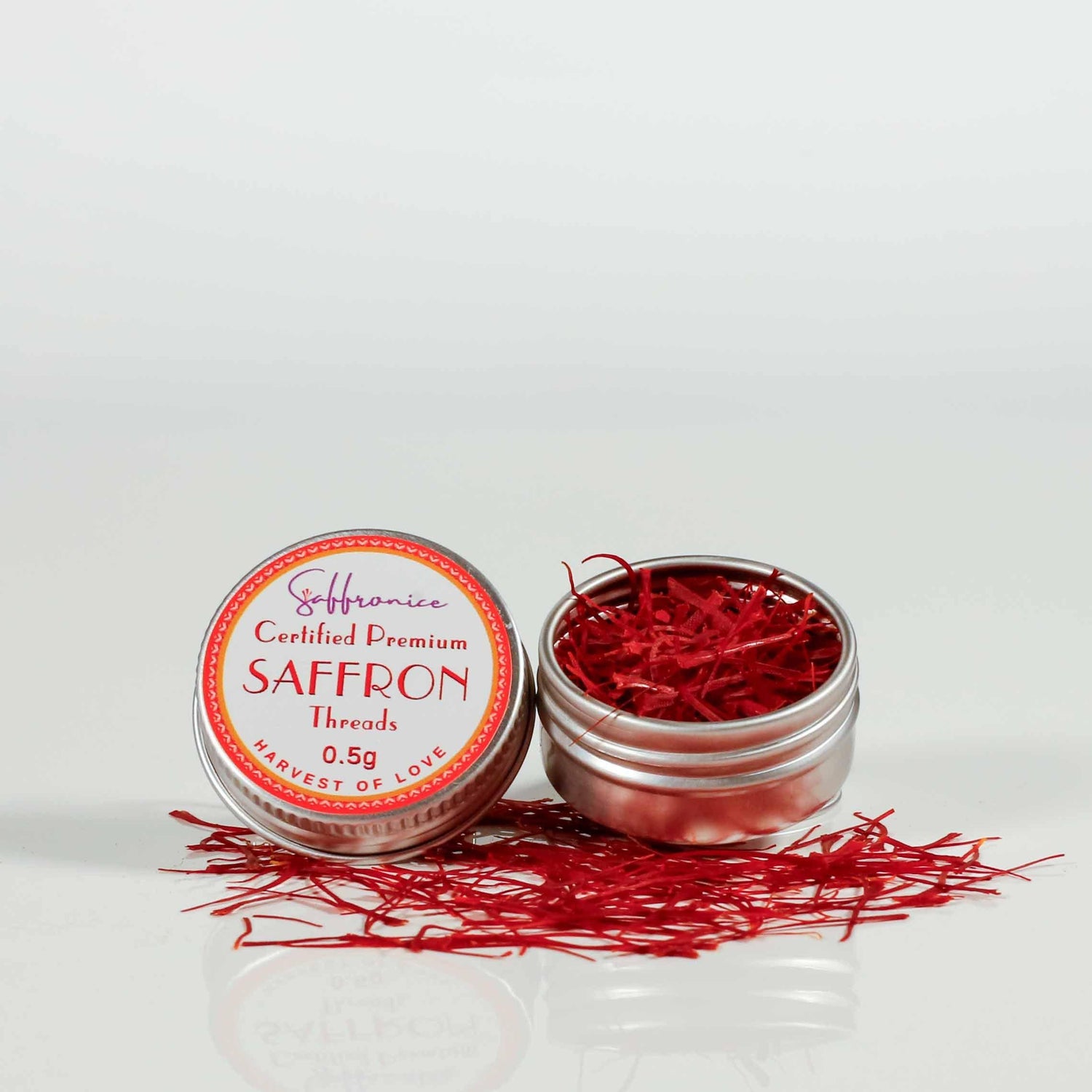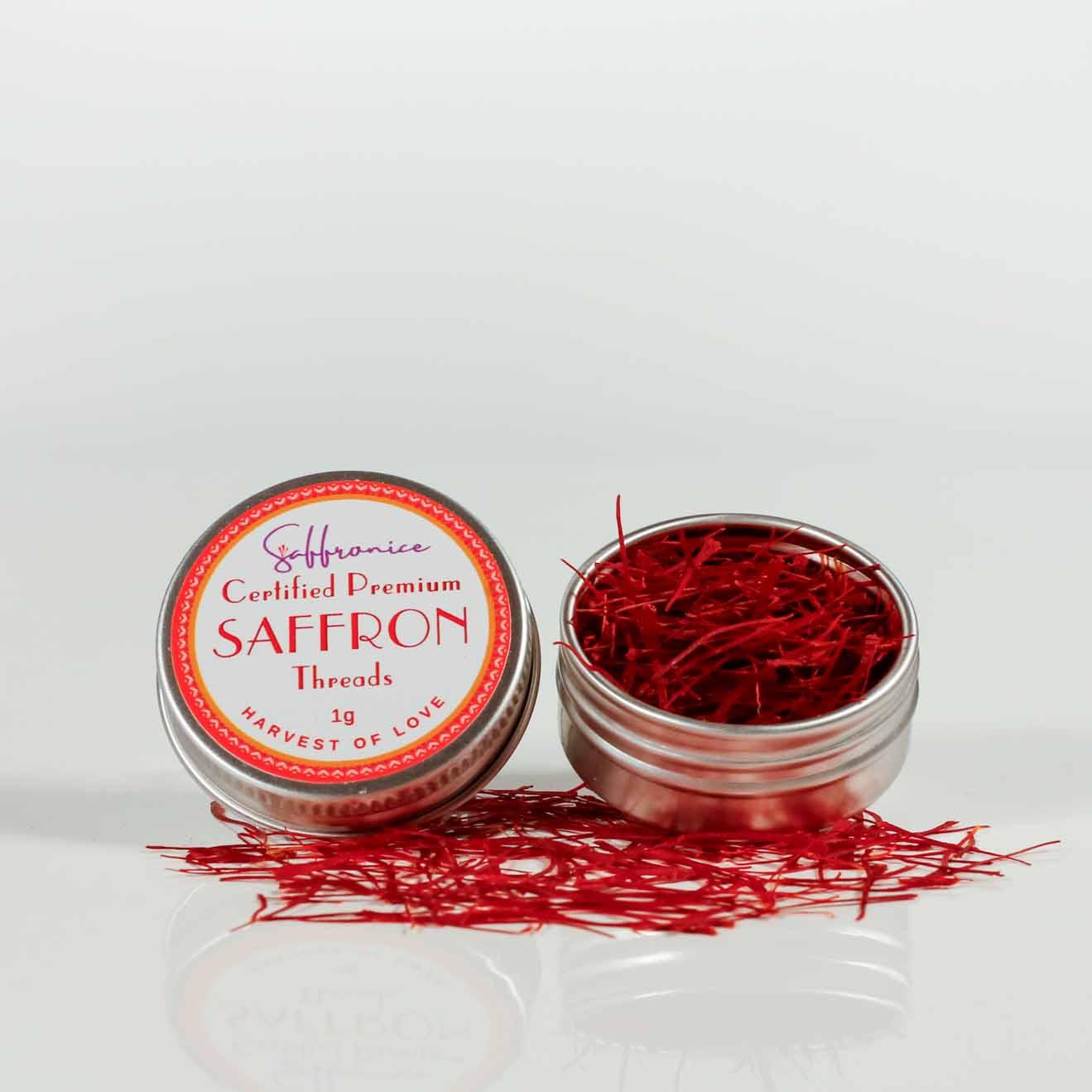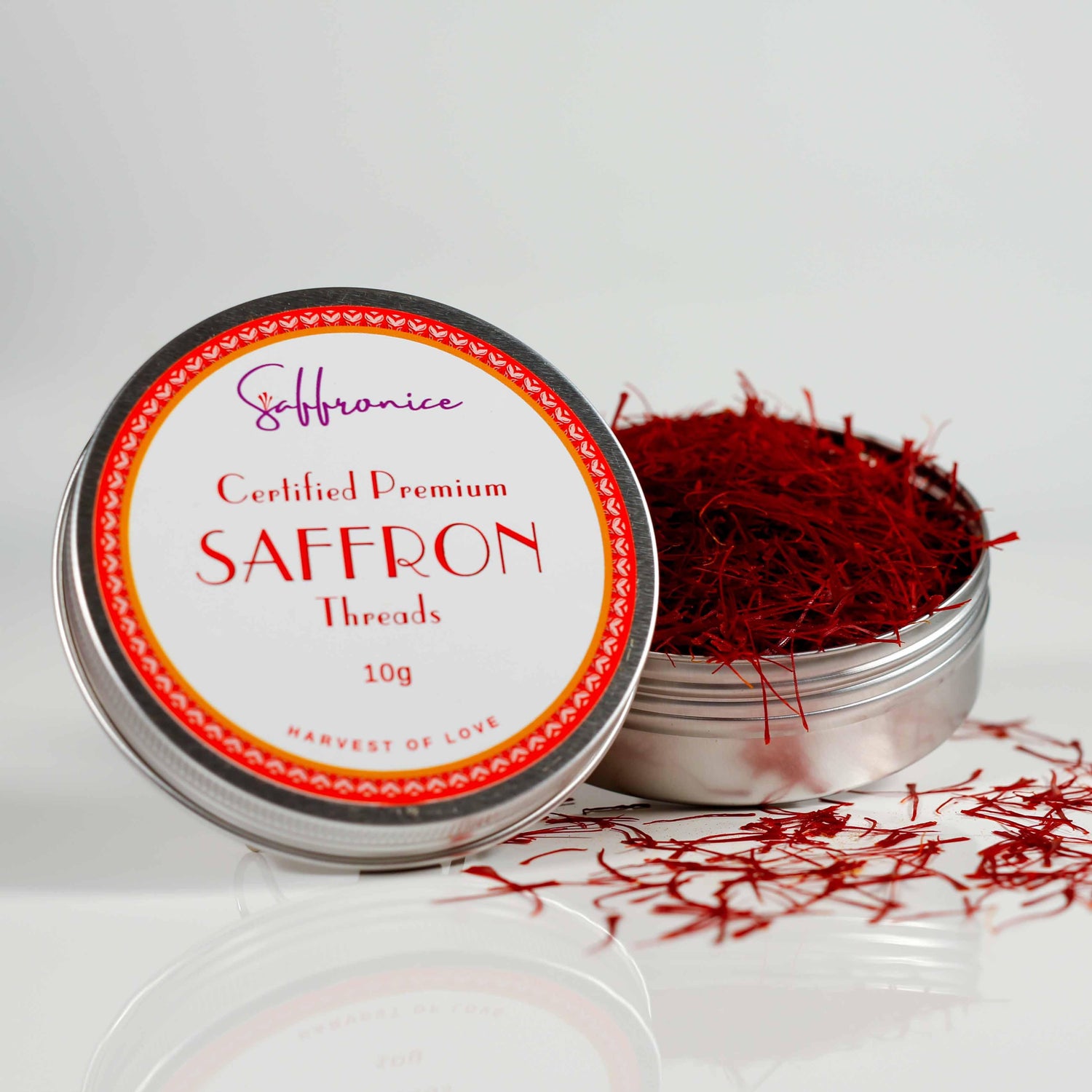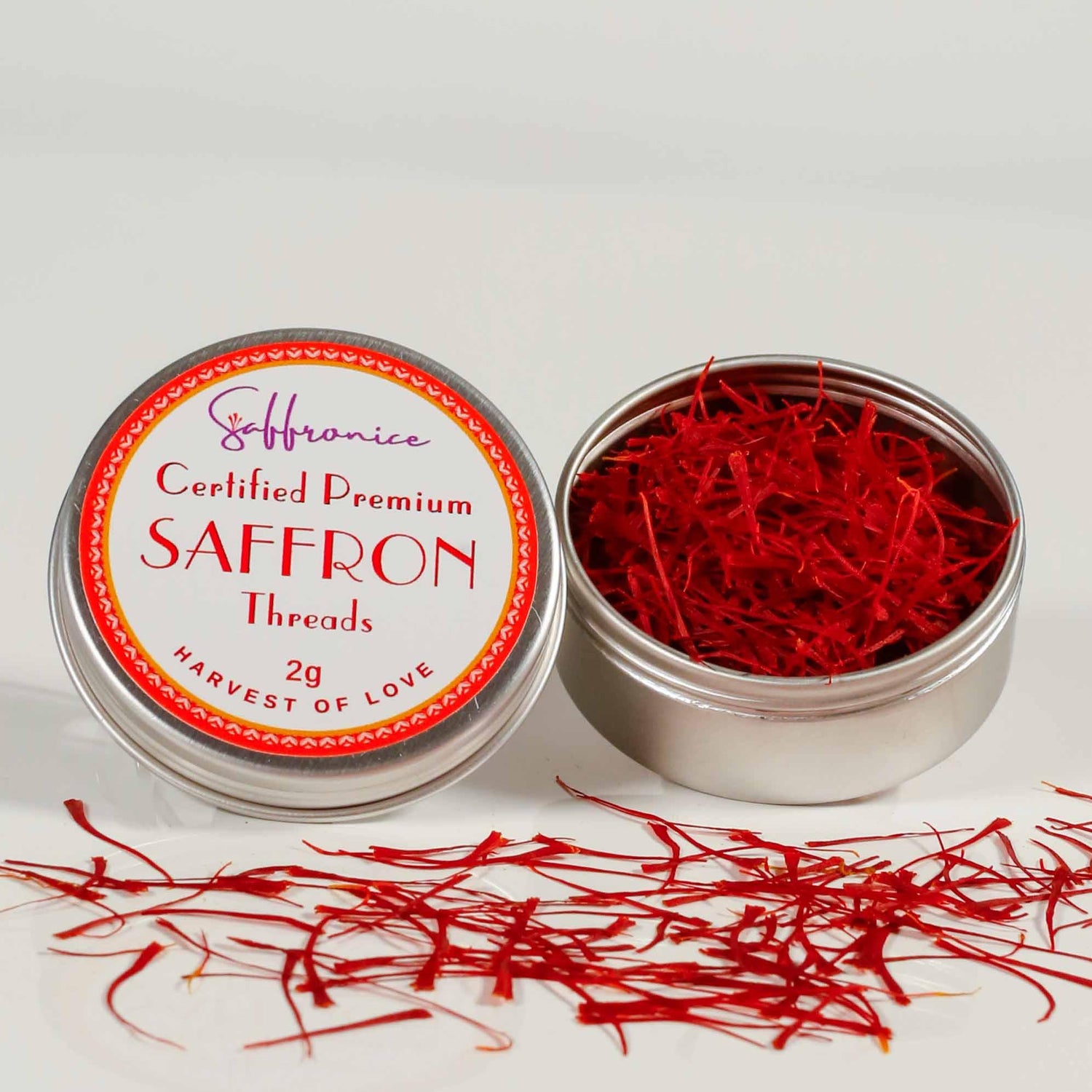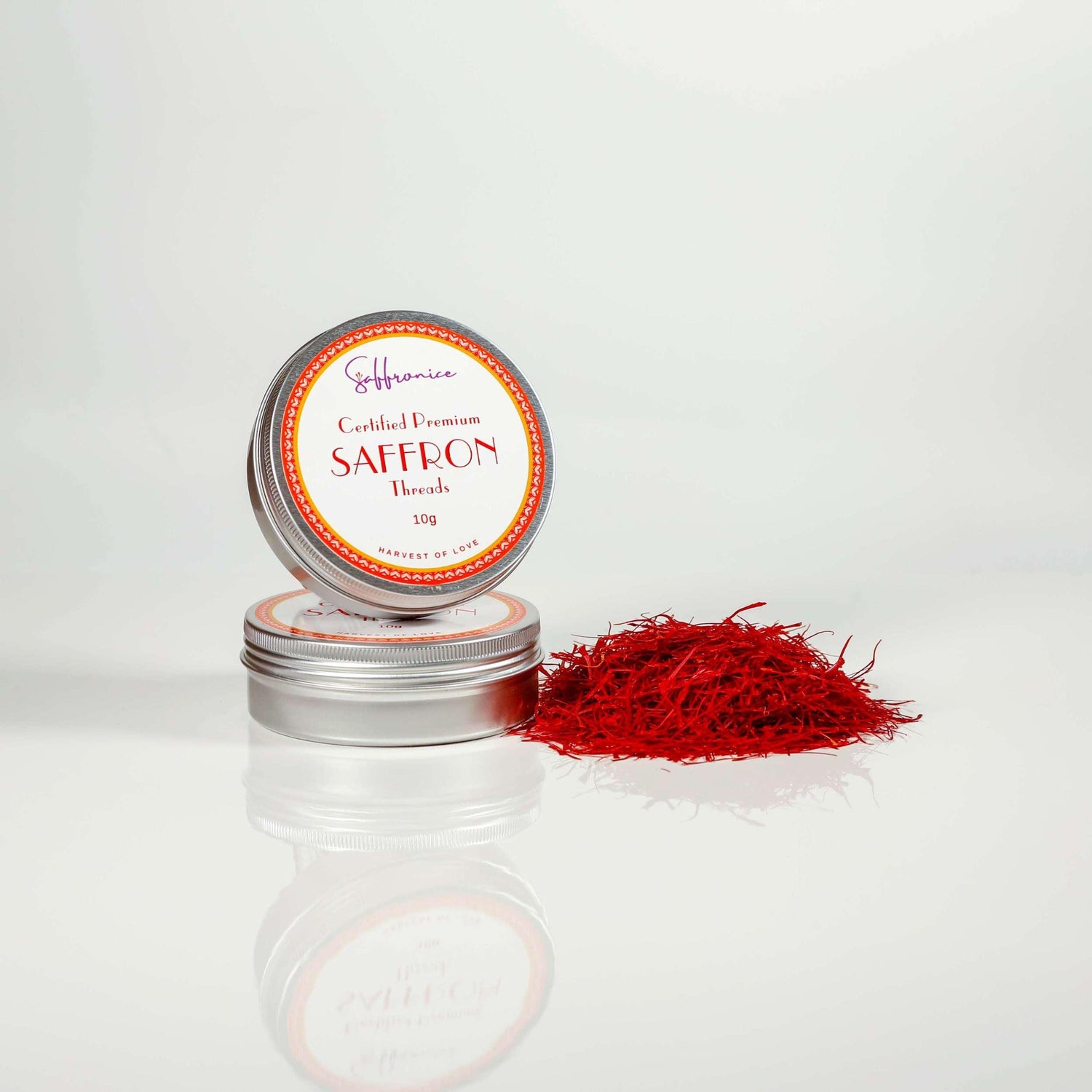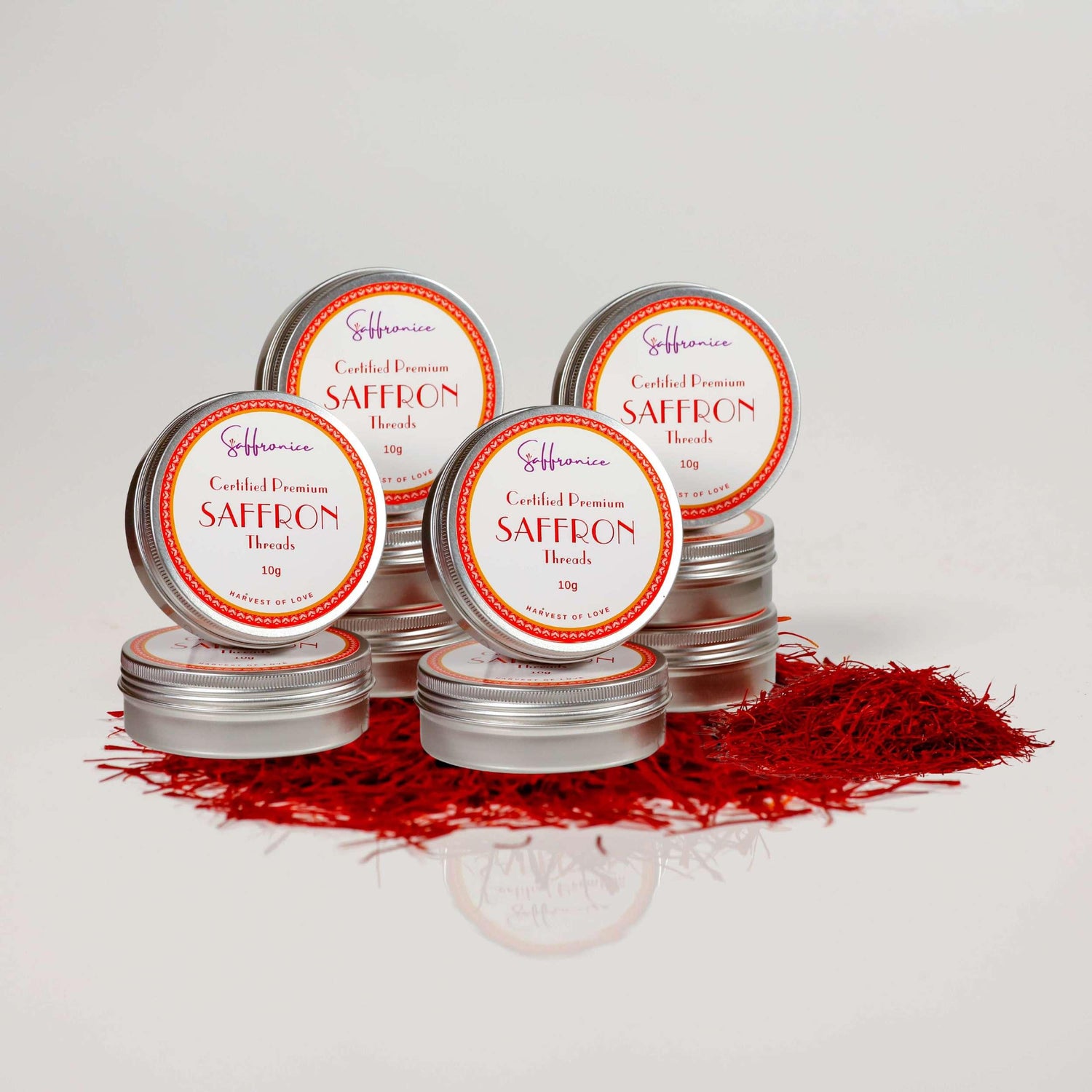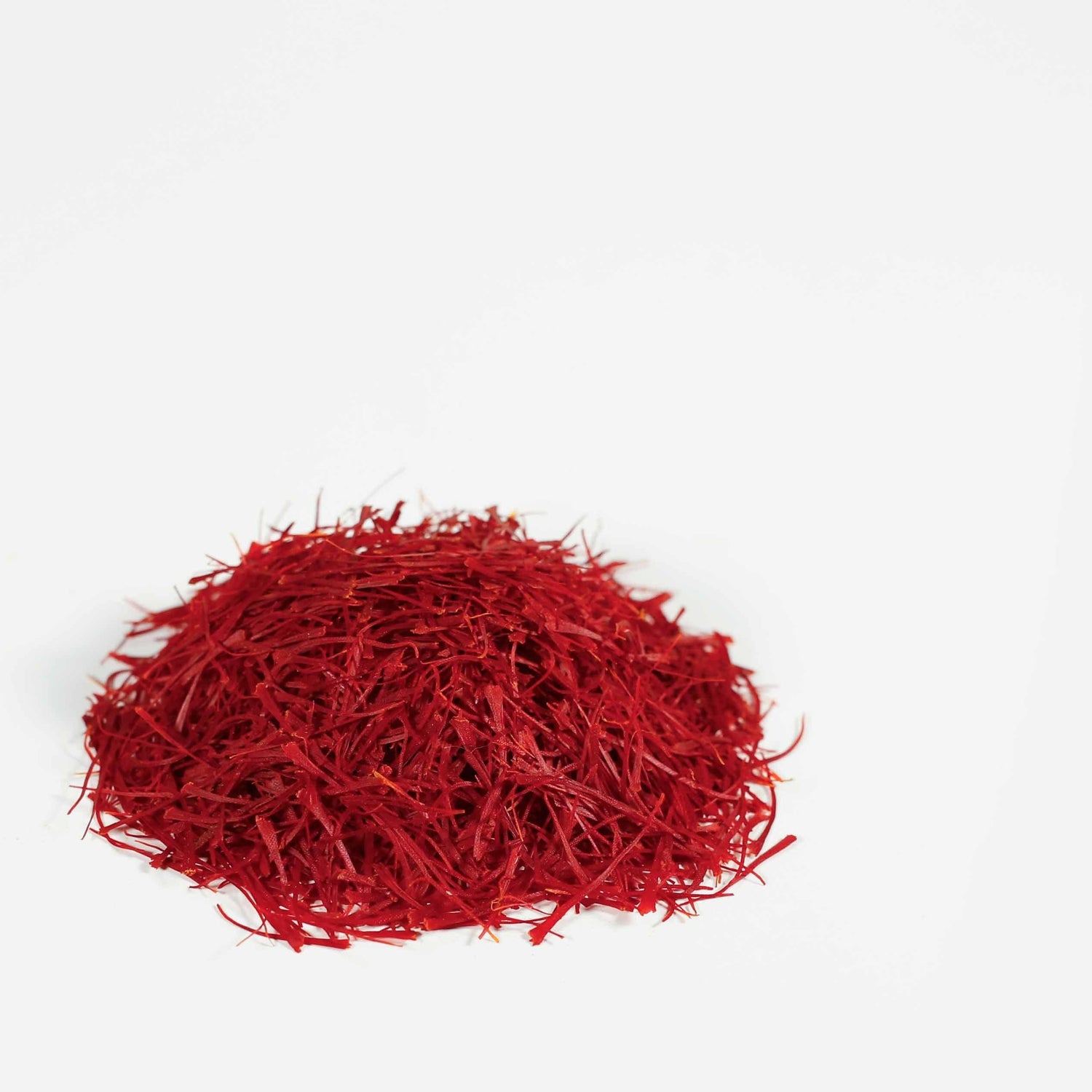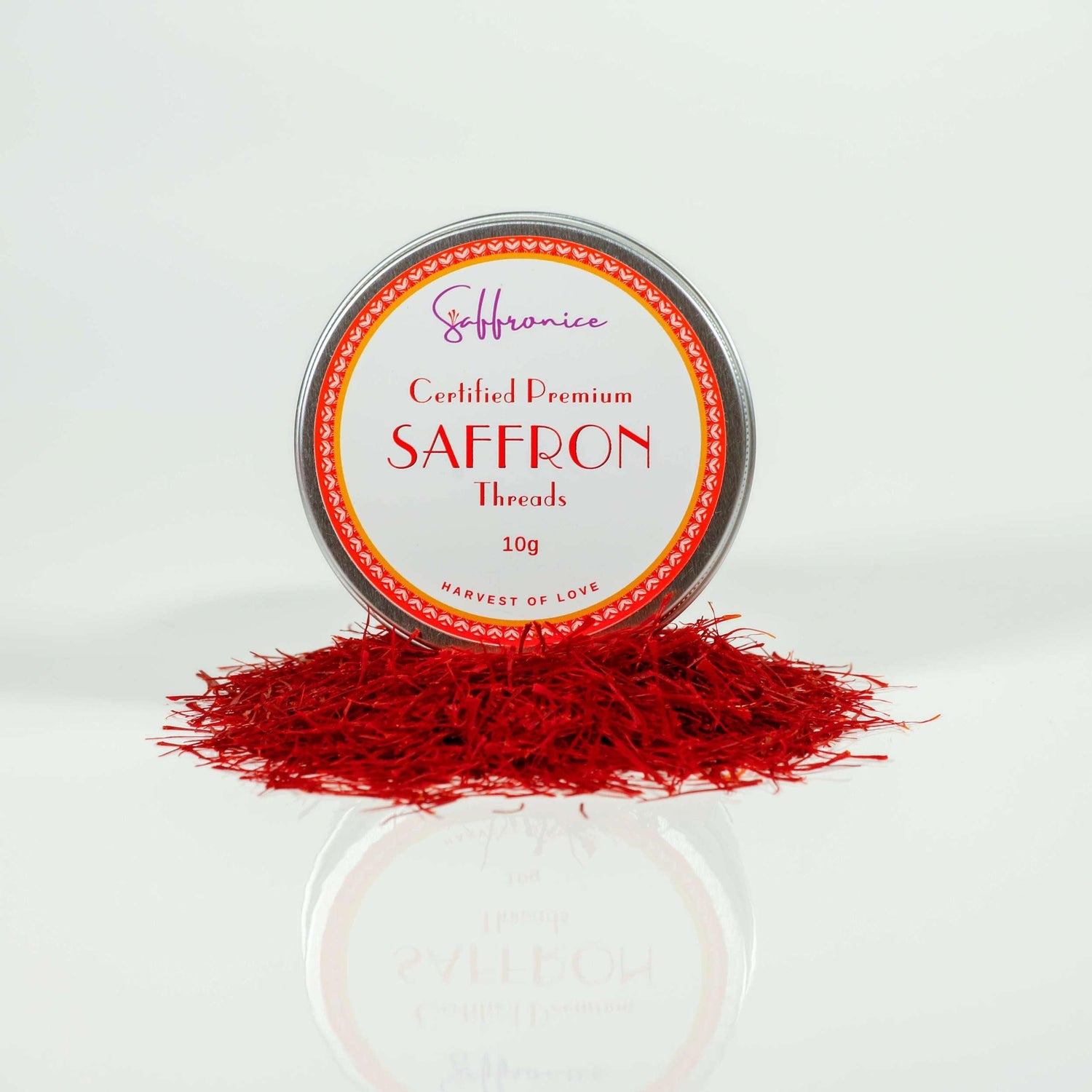Welcome to the fascinating world of Saffron! Often hailed as the most expensive spice in the world, Saffron has been weaving its magic through our kitchens and cultures for centuries. Its story begins in the ancient fields of the Middle East and Mediterranean, where it was revered not just for its culinary prowess but also for its role in traditional medicine, art, and even religious ceremonies. Picture this: Cleopatra used it in her baths for its alluring aroma, and Renaissance artists relied on it for rich golden hues in their paintings. That's quite the resume for a spice!
But Saffron is more than just a historical artefact or a culinary luxury. As we dive deeper into the 21st century, this vibrant thread, handpicked from the Crocus sativus flower, is gaining recognition for something even more remarkable – its nutritional benefits.
In this journey we're about to embark on, we'll explore how this ancient spice, often confined to paella, risotto, and rich stews, is a powerhouse of health benefits. From its surprising nutritional profile to its myriad ways to boost our well-being, Saffron has some impressive secrets to reveal. So, whether you're a seasoned chef, a health enthusiast, or simply curious about this red gold, join me as we uncover the nutritional treasures hidden in each delicate strand of Saffron.
As someone enchanted by Saffron's allure in the kitchen and my study of nutrition, I'm excited to share insights that might change how you look at this exotic spice. Let's unravel the threads of Saffron together!
What is Saffron?

Origin and Characteristics:
Saffron comes from the stigmas (or threads) of the Crocus sativus flower. Each flower produces only three stigmas, which are handpicked and carefully dried, contributing to Saffron's high value and cost.
Colour and Flavour:
Saffron is famed for its striking golden-yellow hue, which it imparts to dishes. Its flavour is complex, often described as slightly sweet, floral, and earthy with a hint of bitterness. The unique compounds like Safranal and Crocin contribute to its distinctive taste and aroma.
Uses in Cooking:
It's a versatile spice in various culinary preparations, from risottos and paellas to sweets and beverages. Saffron adds a luxurious element to dishes and is often used in small quantities due to its intense flavour.
Health Benefits:
Saffron is also known for its potential health benefits, including mood enhancement, antioxidant properties, and potential digestive and heart health aid.
The Saffron Crocus Flower and Harvesting Process

Botanical Description:
The Crocus sativus plant is a small, bulbous perennial that blooms in the autumn. The flowers are purple with three bright red stigmas, which are the saffron threads.
Harvesting Saffron:
The process of harvesting Saffron is labour-intensive and requires precision. The flowers are handpicked early in the morning when they are still closed to protect the delicate stigmas inside.
Stigma Collection and Drying:
The stigmas are carefully separated from the rest of the flower after picking. This task is delicate and is often done manually. The stigmas are then dried, intensifying their flavour and colour. The drying must be done carefully to preserve the delicate flavours and compounds.
Labour and Cost:
The intensive labour and the large number of flowers needed to produce even a tiny quantity of Saffron contribute to its status as one of the most expensive spices in the world. It takes approximately 150,000 flowers to produce 1 kilogram of Saffron.
Macro-nutrient Composition of Saffron
Carbohydrates:
Saffron contains a minimal amount of carbohydrates. This makes it an excellent spice for flavouring dishes without significantly altering the carbohydrate content, which is particularly beneficial for low-carbs or ketogenic diets.
Proteins:
While Saffron does contain proteins, the quantity is relatively small given the typical usage amounts of the spice. However, these proteins contribute to its overall nutritional value.
Fats:
Saffron has negligible fat content. The absence of fats in Saffron means it can be added to any dish without affecting the fat content, making it versatile for various dietary needs.
Significance of Saffron in Various Diets
Ketogenic Diet:
The ketogenic diet emphasises low carbohydrate intake to induce ketosis. In this metabolic state, the body burns fat for energy. Saffron is ideal for this diet due to its low carbohydrate content. It can add flavour and colour to keto-friendly dishes without disrupting the necessary macro-nutrient balance.
Low-Calorie Diets:
Saffron is beneficial for those monitoring calorie intakes as it adds significant flavour and aroma to dishes without adding calories.
Vegetarian and Vegan Diets:
Saffron is purely plant-based, making it suitable for vegetarian and vegan diets. It's a great way to enhance the taste and appearance of plant-based dishes.
Gluten-Free Diets:
Saffron is naturally gluten-free, making it safe for individuals with gluten intolerance or celiac disease.
Anti-inflammatory Diets:
Some studies suggest that Saffron has anti-inflammatory properties, which can be beneficial in diets that reduce inflammation.
Overall Nutritional Benefits
While the direct nutritional contribution of Saffron in terms of macro-nutrients is minimal due to the small quantities used, its value lies in its ability to enhance the flavour and appeal of dishes without adding significant calories or altering macro-nutrient profiles. This makes Saffron valuable to various dietary approaches, particularly those focusing on specific macro-nutrient compositions like the ketogenic diet. Additionally, its potential health benefits, such as antioxidant properties, add to its nutritional appeal.
A Source of Nutrients for Health and for the Treatment of Neuropsychiatric and Age-Related Diseases
Vitamins and Minerals in Saffron

Vitamin B2 (Riboflavin): Essential for energy production, cell function, and fat metabolism.
Vitamin B3 (Niacin): Supports nervous system health, improves cholesterol levels, and aids brain function.
Vitamin B6: Crucial for brain development and function and helps the body convert food into energy.
Folate (Vitamin B9): Important for cell division and the production of DNA, especially vital during pregnancy for fetal development.
Minerals in Saffron
Manganese: Plays a role in bone formation, blood clotting, and reducing inflammation.
Copper: Essential for the formation of red blood cells, immune function, and iron absorption.
Iron: Vital for producing haemoglobin and transporting oxygen throughout the body.
Phosphorus: Important for healthy bones and teeth and helps the body convert food into energy.
Potassium: Regulates fluid balance, muscle contractions, and nerve signals.
Magnesium: Supports muscle and nerve function, blood sugar levels, and blood pressure regulation.
Selenium is essential for thyroid health and reproduction and protects against oxidative damage and infections.
Zinc: Essential for immune function, DNA synthesis, and wound healing.
Contribution to Daily Nutritional Values

High Potency:
Despite the small usage amounts, the vitamins and minerals in Saffron are potent. This means even a tiny quantity can contribute to the daily intake of these essential nutrients.
Antioxidant Properties:
Saffron contains powerful antioxidants, including Crocin, Crocetin, Safranal, and Kaempferol, which help protect the body against oxidative stress and free radicals.
Health Benefits:
These vitamins and minerals contribute to various health benefits, such as improved mood, reduced symptoms of PMS, and potential neuroprotective effects.
Culinary Uses:
Given its intense flavour and colour, a small amount of Saffron is sufficient in most recipes, ensuring you can gain nutritional benefits without overpowering the dish.
In summary, while the quantities of Saffron used in cooking are small, its dense concentration of vitamins, minerals, and antioxidants means it can still make a meaningful contribution to one's daily nutritional intake. This and its potential health benefits make Saffron a valuable addition to a balanced diet.
A scientific review on biological properties
Saffron's Antioxidant Properties
Crocin:
This is the primary antioxidant in Saffron, responsible for its vibrant red colour. Crocin is a carotenoid pigment and has been the subject of extensive research for its health-promoting properties.
Safranal:
Another significant antioxidant in Saffron, safranal, contributes to its distinct aroma and also possesses health-promoting effects.
Kaempferol:
Found in the flower petals of the saffron plant, kaempferol is a flavonoid known for its anti-inflammatory and antioxidant properties.
Crocin and Crocetin:
These are derivatives of carotenoids and are known for their powerful antioxidant activities.
Efficacy and Safety of Saffron Supplementation: Current Clinical Findings
Health Benefits of Antioxidants in Saffron
Blood Glucose Regulation:
Antioxidants in Saffron, especially Crocin, have been studied for their potential in regulating blood sugar levels. They may help improve insulin sensitivity and potentially aid in managing conditions like diabetes.
Cholesterol Management:
Saffron antioxidants can positively affect lipid profiles, helping lower LDL (bad) cholesterol and possibly raising HDL (good) cholesterol levels. This contributes to overall cardiovascular health.
Neuroprotective Effects:
The antioxidants in Saffron are believed to have protective effects on the brain. They help improve mood, memory, and learning ability. They could be beneficial in treating neurological conditions like Alzheimer's and Parkinson's disease.
Eye Health:
Crocin in Saffron has been associated with improved eye health, potentially slowing down retinal degeneration and treating age-related macular degeneration.
Cancer Prevention:
The antioxidant properties of Saffron might contribute to its potential anti-cancer effects, as they help neutralise harmful free radicals and prevent cell damage.
Mental Health:
Saffron has been studied for its potential in treating mild to moderate depression, thanks to its antioxidants that could impact neurotransmitters in the brain.
A study on Antioxidant Properties of Saffron Stigma and Petals
In conclusion, the antioxidants found in Saffron, particularly Crocin, offer a range of health benefits, including aiding in blood glucose regulation and cholesterol management and potentially providing neuroprotective and anti-cancer effects. These properties make Saffron a culinary delight and a valuable component in health and wellness regimens.
Anti-Inflammatory Benefits of Saffron

Saffron is increasingly recognised for its anti-inflammatory properties, making it a valuable ingredient in culinary and medicinal contexts. These properties stem from the unique compounds within Saffron, which work together to alleviate various inflammatory conditions.
Anti-inflammatory properties of drugs from saffron crocus
Overview of Saffron's Role in Alleviating Inflammatory Conditions
Arthritis and Joint Pain:
Saffron contains anti-inflammatory compounds that can help reduce swelling and pain associated with arthritis and other joint-related conditions. It may aid in reducing the severity of symptoms and improving joint mobility.
Gastrointestinal Disorders:
Saffron has been traditionally used to soothe the gastrointestinal tract. It can help reduce inflammation in conditions like gastritis, irritable bowel syndrome (IBS), and ulcerative colitis.
Respiratory Conditions:
The spice may also be beneficial in managing inflammation in respiratory conditions such as asthma and bronchitis, helping to ease breathing difficulties.
Cardiovascular Health:
By reducing inflammation in blood vessels, Saffron can lower the risk of atherosclerosis (hardening of the arteries) and other heart diseases.
Saffron; An updated review on biological properties with special focus on cardiovascular effects
Skin Conditions:
Saffron's anti-inflammatory properties can be advantageous in treating skin inflammations like acne, psoriasis, and eczema, contributing to healthier skin.
Mechanisms Behind Saffron's Anti-Inflammatory Properties
Inhibition of Inflammatory Cytokines:
Saffron contains compounds that can inhibit the production of inflammatory cytokines – proteins released by cells contributing to inflammation.
Antioxidant Activity:
The antioxidants in Saffron, such as crocin, safranal, and kaempferol, neutralise free radicals that can cause oxidative stress and inflammation.
Inhibiting NF-kB Pathway:
Saffron can interfere with the NF-kB pathway, vital in the inflammatory response. By inhibiting this pathway, Saffron reduces the expression of genes involved in inflammation.
Modulation of Immune Response:
Some components in Saffron can modulate the immune system, potentially reducing autoimmune reactions that contribute to inflammatory conditions.
It's important to note that while Saffron shows promise in reducing inflammation, it should be used as a complement to, not a replacement for, traditional medical treatments. Additionally, the exact dosage and long-term effects of Saffron as an anti-inflammatory agent remain subjects of ongoing research. Nonetheless, its inclusion in a balanced diet can contribute to overall health and well-being, particularly for those dealing with inflammatory conditions.
Mental Health Benefits: Saffron as a Mood Enhancer

Saffron has garnered attention in mental health, particularly for its potential as a natural mood enhancer. Various studies have explored its effects on mental health, with a focus on depression.
Effect of saffron supplementation on symptoms of depression and anxiety
Research on Saffron's Effects on Mental Health
Studies on Depression:
Several clinical studies have indicated that Saffron may have antidepressant properties. Research has compared saffron supplements to conventional antidepressants like fluoxetine (Prozac) and imipramine (Tofranil), finding that Saffron can be equally effective in treating mild to moderate depression.
Impact on Serotonin:
Saffron is thought to influence mood by affecting serotonin levels in the brain. Serotonin is a neurotransmitter known to regulate mood, and imbalances in serotonin levels are linked to depression.
Reduction in Anxiety and Stress:
Beyond depression, Saffron has shown potential in reducing symptoms of anxiety and stress. It may act on the nervous system to promote relaxation and alleviate tension.
Effects of Saffron Extract Supplementation on Mood & Well-Being
Saffron in the treatment of depression, anxiety and other mental disorders
Saffron as a Natural Mood-Enhancing Supplement

Potential as a Natural Alternative:
For individuals seeking natural alternatives to conventional antidepressants, Saffron presents a promising option. Its mood-enhancing effects and a lower likelihood of side effects make it an attractive supplement.
Synergistic Effects with Other Treatments:
Saffron can be used in conjunction with other treatments for depression, such as therapy and lifestyle changes. It may enhance the overall effectiveness of a comprehensive mental health treatment plan.
Safety and Tolerability:
Generally, most individuals consider saffron safe and well-tolerated when consumed in culinary or supplement form. However, it's crucial to consult healthcare providers before starting any new supplement, especially for those with existing health conditions or taking other medications.
Dosage and Administration:
The effective dosage of Saffron for mood enhancement typically ranges from 15 to 30 mg twice daily. However, the optimal dose can vary, and it's essential to follow the guidance of a healthcare professional.
It's important to remember that while Saffron shows promise as a mood enhancer, it is not a substitute for professional medical treatment in cases of severe depression or other mental health disorders. Its use should be considered part of a broader approach to mental health that includes professional guidance and support. Nonetheless, the growing body of research supporting Saffron's positive effects on mental health highlights its potential as a beneficial supplement in this field.
Saffron (Crocus sativus L.): As an Antidepressant
Saffron in Weight Management

Saffron has been gaining attention in weight management, with studies suggesting its potential role in aiding weight loss and reducing food cravings. This is attributed to its unique properties that can influence factors related to weight management.
Saffron: A Natural Potent Antioxidant as a Promising Anti-Obesity Drug
Analysis of Studies on Saffron's Role in Weight Loss
Reduction in Snacking and Appetite:
Saffron may help reduce snacking frequency and overall appetite. This effect is likely due to Saffron's impact on mood, particularly by increasing serotonin levels, which can reduce emotional eating.
Saffron and crocin improved appetite, dietary intakes and body composition in patients with coronary artery disease
Impact on Satiety:
Saffron is believed to enhance satiety, or the feeling of fullness, which can lead to reduced calorie intake. This effect contributes to its potential as a tool for weight management.
Influence on Metabolism:
While the direct impact of Saffron on metabolism is less extensively studied, some evidence suggests it may positively influence metabolic factors linked to weight.
The effect of saffron on weight and lipid profile: A systematic review
Practical Advice on Incorporating Saffron into a Weight Management Plan
As a dietary supplement:
Saffron can be taken as a supplement, often in capsules or extracts. The typical dosage for weight management purposes ranges from 15 to 30 mg twice daily. However, it's essential to consult a healthcare provider before starting any supplement regimen.
The Effect of Saffron Supplementation on Weight Management
Inclusion in Meals:
Incorporating Saffron into daily meals can be an enjoyable way to benefit from its properties. It can be added to soups, stews, rice, and teas. Using Saffron in cooking not only enhances flavour but can also contribute to a reduced desire to snack.
Mindful Eating Practices:
Pairing Saffron with a mindful eating approach can be effective. Paying attention to hunger cues and eating slowly can maximise the satiety-enhancing effects of Saffron.
Part of a Balanced Diet:
While Saffron can aid in weight management, it should be part of a balanced diet rich in fruits, vegetables, whole grains, lean proteins, and healthy fats. Saffron is not a standalone solution but can be valuable to a healthy lifestyle.
Regular Exercise:
Combining Saffron with regular physical activity can enhance overall weight loss efforts. Exercise is a critical component of any weight management plan.
It's important to note that while Saffron can be a beneficial supplement in weight management, it should not be relied upon as the sole weight loss method. A comprehensive approach that includes dietary changes, exercise, and possibly the guidance of a healthcare or nutrition professional is crucial for effective and sustainable weight management. The potential of Saffron to reduce cravings and increase satiety can make it a valuable tool within this broader strategy.
Saffron for Women's Health: Easing PMS Symptoms

Saffron has been traditionally used for various aspects of women's health, including the alleviation of premenstrual syndrome (PMS) symptoms. Recent research has begun to support these traditional uses, shedding light on Saffron's potential benefits in this area.
Saffron for the Management of Premenstrual Dysphoric Disorder: A Randomized Controlled Trial
Traditional and Modern Uses of Saffron for PMS Relief
Traditional Uses:
Historically, Saffron has been used in various cultures to remedy menstrual discomfort and PMS symptoms. It was often administered in teas or as a spice in food to help ease these symptoms.
Modern Applications:
In contemporary times, Saffron continues to be valued for its potential to alleviate PMS symptoms. It is used in supplement form or incorporated into diets, often recommended for its mood-stabilising and antispasmodic properties.
Research Supporting Saffron's Benefits for PMS
Mood Enhancement:
One of the critical symptoms of PMS is mood swings and emotional distress. Saffron has been shown to have mood-enhancing properties, potentially due to its impact on serotonin levels, which can help stabilise mood swings associated with PMS.
Physical Symptom Relief:
Studies have indicated that Saffron may help reduce physical symptoms of PMS, such as cramps and bloating. This is attributed to its anti-inflammatory and analgesic properties.
Hormonal Balance:
While the direct effects of Saffron on hormonal balance need more research, its overall benefits in mood regulation and symptom relief can indirectly contribute to a more balanced hormonal state during the menstrual cycle.
Saffron for the Management of Premenstrual Dysphoric Disorder: A Randomized Controlled Trial
Dosage and Administration:
Research studies typically use dosages ranging from 30 to 300 mg of Saffron Supplements daily to relieve PMS symptoms. However, it is essential to consult with a healthcare provider for appropriate dosages and to ensure safety, especially for those with specific health conditions or who are taking other medications.
Saffron presents a promising natural alternative for women seeking relief from PMS symptoms. Its mood-enhancing and anti-inflammatory properties can play a role in easing both emotional and physical symptoms associated with PMS. However, it's essential to approach its use as part of a broader wellness strategy, considering individual health needs and consulting with healthcare professionals. As research continues, understanding Saffron's full potential in women's health, especially for PMS relief, will likely expand and deepen.
The Future of Saffron in Health Research

The future of Saffron in health research is vibrant and promising, with ongoing and emerging studies exploring its potential benefits for significant health concerns. The growing interest in Saffron within the medical community is driven by its unique properties and the preliminary positive results of various studies.
Ongoing and Emerging Research into Saffron's Potential Benefits
Multiple Sclerosis (MS):
Research is exploring Saffron's potential neuroprotective and anti-inflammatory effects in the context of MS. Early studies suggest that Saffron might help manage symptoms and possibly slow the progression of MS due to its antioxidant properties and ability to modulate immune responses.
Alzheimer's Disease:
Saffron's potential cognitive-enhancing properties are being investigated as a treatment for Alzheimer's disease. Studies have shown that Saffron may improve cognitive function in patients with mild to moderate Alzheimer's, potentially due to its antioxidant and anti-inflammatory effects.
Cancer:
There is increasing research into Saffron's potential anti-cancer properties. Compounds in Saffron, such as crocin and crocetin, have been studied for their ability to inhibit the growth of various cancer cells, including leukemia, ovarian carcinoma, colon adenocarcinoma, and soft tissue sarcoma. These studies explore how Saffron might induce apoptosis (programmed cell death) in cancer cells and inhibit tumour growth.
Growing Interest in Saffron in the Medical Community
Natural Treatment Alternative:
There is a growing interest in finding natural alternatives or complements to conventional treatments for various diseases. With its minimal side effects and potential therapeutic properties, Saffron is gaining attention in this context.
Holistic Approach to Health:
The holistic approach to health, which emphasises treating the whole person and not just the symptoms, is becoming more popular. With its wide range of potential health benefits, Saffron fits well into this paradigm.
Increasing Research Funding and Studies:
As preliminary studies show promising results, more research funding and clinical trials are directed towards exploring the full range of Saffron's medicinal properties.
Integration into Conventional Medicine:
As evidence of Saffron's efficacy grows, there is a potential for its integration into conventional medical practices, either as a standalone treatment or as part of a complementary therapy approach.
The future of Saffron in health research looks promising, with its potential to contribute significantly to treating severe health conditions like Multiple Sclerosis, Alzheimer's disease, and cancer. The medical community's growing interest in natural and holistic treatments positions saffron as a notable subject of ongoing and future research. However, it's important to note that while these studies are promising, more research is needed to fully understand Saffron's therapeutic potential and to establish standardised dosages and administration methods.
How to Incorporate Saffron into Your Diet

Incorporating Saffron into your daily diet is a delightful way to enjoy its unique flavour, colour, and potential health benefits. Here are some practical tips and ideas for using Saffron in everyday meals, along with suggestions for maximising its nutritional benefits:
Practical Tips for Including Saffron in Daily Meals
-
Start with Small Amounts: Saffron is a potent spice, so a little goes a long way. Start with a small pinch (about 30-40 threads) to flavour a dish serving 4-6 people.
-
Use in Rice Dishes: Saffron is famous for its use in dishes like paella, risotto, and biryani. It adds a beautiful colour and rich flavour to these rice-based dishes.
-
Enhance Soups and Stews: Add a pinch of Saffron Powder to soups and stews. It pairs well with ingredients like tomatoes, chicken, and seafood.
-
Incorporate into Teas and Beverages: Pure Saffron Threads can be steeped in hot water to make a soothing tea. Add it to warm milk or lattes for a comforting drink.
-
Use in Baking: Saffron can be used in baking to add a unique flavour and colour to bread, cakes, and pastries.
- Specifically using as medicine: Learn how to prepare and use saffron for its medicinal benefits.
Maximising the Nutritional Benefits of Saffron in Dishes
-
Pair with Healthy Fats: To increase the absorption of Saffron's fat-soluble compounds, combine it with healthy fats like olive oil, nuts, or avocados.
-
Combine with Antioxidant-Rich Foods: Enhance its antioxidant benefits by pairing Saffron with foods high in other antioxidants, such as berries, dark leafy greens, and other colourful vegetables.
-
Infuse in Warm Water or Broth: To fully release its colour and flavour, infuse the Saffron in a small amount of warm water, broth, or milk for about 10 to 15 minutes before adding it to the dish.
-
Balance with Mild Ingredients: Since Saffron has a strong flavour, pair it with mild ingredients like rice, chicken, fish, and dairy, which won't overshadow its taste.
-
Add Towards the End of Cooking: To preserve Saffron's delicate flavour and health properties, add it towards the end of the cooking process, especially in recipes with a shorter cooking time.
-
Creative Breakfast Options: Incorporate Saffron into your breakfast by adding it to oatmeal, smoothies, or yoghurt with a bit of honey for a nutritious start to your day.
Remember, while Saffron is a beneficial addition to your diet, using it as part of a balanced and varied diet is essential. With these tips, you can easily enjoy Saffron's unique taste and potential health benefits in your daily meals.
Conclusion
In conclusion, Saffron stands out for its exotic flavour and vibrant colour and its impressive array of nutritional and health benefits. Here's a summary of the key points we've discussed about this remarkable spice:
-
Rich in Antioxidants: Saffron is loaded with potent antioxidants like crocin, crocetin, and safranal, which combat oxidative stress and may offer protection against various health conditions.
-
Mood Enhancement: Saffron has shown potential in improving mood and could be beneficial for those dealing with depression and anxiety, thanks to its impact on serotonin levels.
-
Anti-Inflammatory Properties: Its anti-inflammatory qualities make it a natural option for reducing inflammation-related symptoms in arthritis, gastrointestinal disorders, and skin inflammation.
-
Potential in Weight Management: Saffron may aid in weight loss and management by reducing appetite and cravings. It is a helpful supplement in a balanced diet.
-
Beneficial for Women's Health: Saffron has been traditionally used to ease PMS symptoms and continues to be studied for effectiveness.
-
Promising Research in Serious Health Conditions: Ongoing research explores Saffron's potential benefits in managing and treating conditions like Multiple Sclerosis, Alzheimer's disease, and various forms of cancer.
-
Nutritional Profile: Saffron is a good source of several vitamins and minerals, contributing to overall health despite its minimal calorie contribution.
Given these compelling benefits, it's clear that integrating Saffron into your diet can be an excellent step towards enhancing your overall health and wellbeing. Whether used as a spice in cooking, a flavourful addition to beverages or a dietary supplement, Saffron offers more than just culinary delight—it's a treasure trove of health benefits waiting to be explored. As with any supplement or dietary change, consulting with a healthcare provider is recommended, especially for those with specific health conditions or concerns. Enjoy Saffron's unique flavour and myriad health benefits, and consider making it a regular diet.
FAQ Section
-
What is Saffron, and where does it come from?
Saffron is a spice derived from the dried stigmas of the Crocus sativus flower. It's primarily cultivated in Iran, Greece, Morocco, and India. Each flower produces only a few stigmas, making Saffron one of the most valuable spices in the world.
-
How does Saffron benefit mental health?
Saffron contains compounds that affect serotonin levels in the brain, which can help improve mood and reduce symptoms of depression and anxiety.
-
Can Saffron help with weight loss?
Saffron may aid in weight loss by reducing appetite and cravings, possibly due to its mood-enhancing properties, which can help control emotional eating.
-
What are the anti-inflammatory benefits of Saffron?
Saffron contains antioxidants and compounds that can reduce inflammation, potentially beneficial for conditions like arthritis, gastrointestinal disorders, and certain skin conditions.
-
How much Saffron should I use in my cooking?
A small pinch of Saffron (30-40 threads) is usually sufficient for a dish serving 4-6 people. Saffron has a potent flavour and colour.
-
Is Saffron safe for everyone?
Saffron is generally safe when used as a spice or supplement in moderation. However, high doses can be toxic, and pregnant women and individuals with certain health conditions should consult a healthcare provider before using saffron supplements.
-
What nutrients are present in Saffron?
Saffron contains various vitamins and minerals, including vitamins B2, B3, B6, folate, manganese, copper, iron, potassium, and magnesium. It's also rich in antioxidants.
-
Can saffron improve skin health?
Due to its anti-inflammatory and antioxidant properties, Saffron may help improve skin health and is often used in skincare products for its potential benefits.
-
How do I store Saffron?
Saffron should be stored in an airtight container in a cool, dark place to protect it from light and moisture, which can diminish its flavour and potency.
-
Can Saffron be used to treat medical conditions?
While Saffron shows promise in treating specific conditions, it should not replace conventional medical treatments. It's best used as a complement to traditional therapies, and you should consult with a healthcare provider for advice.
Learn more about Saffron’s Health Benefits and Risks





